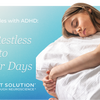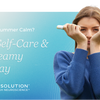How Is The Body Affected By Sleep Deprivation?

It’s official: “more than a third of American adults are not getting enough sleep on a regular basis.” This is a conclusion from a new study commissioned by the Centers for Disease Control and Prevention (CDC) (Source). The Medical Daily, a website dedicated to covering health and science news, adds that “in the United States alone, an estimated 50 to 70 million adults report facing sleep difficulties.” It adds: “Over time, sleep deprivation has been linked to weight gain, worse memory, an increased risk of injury, and more” (Source).
The non-profit academic medical center, Johns Hopkins Medicine, reports that about 6,000 fatal accidents are reported every year in the US because of sleep deprivation. The same organization says that your risk of suffering from obesity, heart disease, and diabetes increases if you’re not getting enough sleep (Source).
In this article, we took some time to look at the effects of sleep deprivation on the body. We start by defining the concept of sleep deprivation and looking at what is considered enough sleep. Finally, the piece focuses on how sleep deprivation affects your body and what you can do to avoid it.
What Is Sleep Deprivation?
Sleep deprivation is a condition where an individual’s lack of sufficient sleep starts to affect their awareness, health, and general performance (Source).
Sleep deprivation is not only linked to the amount of time you spend sleeping, but it is also connected to the quality of sleep. This implies that even though you may be spending the recommended number of hours in bed, you could still suffer from sleep deprivation if your sleep is habitually disturbed to the extent that you are not sleeping through all the stages of the sleep cycle (Source).
How Much Is Enough Sleep?
The amount of sleep you need each day changes over the course of your life; hence, the idea of sufficient sleep can vary from one person to another. However, the American Academy of Sleep Medicine (AASM) recently came up with recommendations on the average amount of sleep a typical individual needs. These recommendations, presented on the table below, are also endorsed by the National Heart, Lung, and Blood Institute (NIH) (Source).
| Age | Recommended Amount of Sleep |
| Infants aged 4-12 months | 12-16 hours a day (including naps) |
| Children aged 1-2 years | 11-14 hours a day (including naps) |
| Children aged 3-5 years | 10-13 hours a day (including naps) |
| Children aged 6-12 years | 9-12 hours a day |
| Teens aged 13-18 years | 8-10 hours a day |
| Adults aged 18 years or older | 7-8 hours a day |
(Source).
Notwithstanding the recommendations of the AASM, it remains your responsibility to find out how much sleep you need and then work towards achieving it.
But how do you determine the amount of sleep you need as an individual? One simple test is that if you wake up feeling tired and spend the day looking forward to a chance to nap, it’s most likely that you’re not getting adequate sleep (Source).
Factors Linked to Poor Sleep
Various factors have been linked to poor sleep. These include medical conditions such as insomnia (habitual inability to sleep), parasomnia (abnormal emotions, behaviors, dreams, or perceptions while sleeping) restless leg syndrome (an uncontrollable urge to move the legs), and sleep apnea (a sleeping disorder where breathing stops and starts continuously) (Source).
However, bad sleeping habits have been identified as the leading cause of poor sleep (Source).
Sleep Deprivation Symptoms
How do you know if you may be suffering from sleep deprivation? The website SleepHelp.org provides some examples (see below) of common signs of sleep deprivation (Source):
- Obvious interruption in sleep patterns: Spending most of your time in bed tossing and turning, generally struggling to keep yourself asleep, or waking up too early and failing to fall back asleep.
- Feeling sleepy for the greater part of the day: If you suffer from a high level of sleep deprivation, you may find yourself involuntarily dozing off, and feeling tired and sleepy most of the time.
- Cognitive problems: Difficulty in staying focused, failing to recall stuff learned and reacting slowly.
- Mood Swings: Feelings of frustration and being irritable.
The Effects of Lack of Sleep on the Brain
Sleep deprivation may cause irritability, drowsiness, feelings of anxiety and depression, inability to concentrate, and microsleeps (a situation where you briefly fall asleep, at times not even being aware) (Source).
Writing for AceFitness.org, a website owned by the American Council on Exercise, Brett Klika cites the National Institute of Child Health and Human Development (NICHD) which says that “from a day-to-day standpoint, lack of sleep can impair coordination and short-term memory, while increasing the negative impact of stress” (Source).
In a piece produced for the financial and business news website, Business Insider, Jennifer Still also quotes the NICHD. She writes, “Not getting enough quality sleep affects mood, performance, concentration, and our ability to form memories.” Still also adds that sleep deprivation “can hurt your relationships and increase anxiety, too.”
Sleep deprivation can also increase your risk of developing dementia by 33% (Source). The Alzheimer’s Association defines dementia as “an overall term for diseases and conditions characterized by a decline in memory, language, problem-solving, and other thinking skills that affect a person’s ability to perform everyday activities” (Source).
Individuals not getting adequate sleep have a higher risk of depression, fuzzy thinking, forgetting quickly, anxiety, and irritability. Apart from impacting your mood, concentration, performance, and memory, Johns Hopkins Medicine also reports that sleep deprivation can also prematurely age your brain by between three and five years (Source).
Weight Problems
The American Sleep Association cites a study involving rats, which concluded that sleep-deprived rats tend to eat more than those that get adequate sleep. This study suggests that chronic sleep debt encourages an increase in appetite. Inadequate sleep also disrupts the hormones that control hunger and glucose metabolism (The process in which the body converts food to energy). One of the consequences of this is an increase in weight and the other challenges linked to it, such as diabetes and hypertension (Source).
Another possible reason for the link between sleep deprivation and weight challenges is that sleep deficit is linked to the development of cravings for sweet, starchy, and salty food. Added to this are higher levels of ghrelin — commonly known as the hunger hormone — and lower levels of leptin, the hormone that helps in controlling appetite (Source).
Increased Risk of Heart Disease and Diabetes
In an article written for Forbes and also citing the NICHD, Julian Vigo reports that “inadequate sleep is associated with numerous health problems, including the increased risk of high blood pressure, heart disease, obesity and diabetes” (Source).
According to Johns Hopkins Medicine, when compared to people who get regular quality sleep, poor sleepers are three times more likely to end up with type 2 diabetes. The same institution also reports that inadequate sleep also leads to a weaker immune system and increases the risk of developing heart disease by 48%. Affected individuals are three times more likely to catch a cold (Source).
Higher Risk of Certain Cancers and Skin Aging
A study published by the Journal of the National Cancer Institute links night-shift work with an increased risk of colorectal cancer. Colorectal cancer is a type of cancer commonly known as colon cancer, bowel cancer, or rectal cancer. It starts in sections of the large intestine (Source).
Even though the study does not necessarily refer to sleep deprivation, it concludes that “exposure to light at night suppresses the physiologic production of melatonin, a hormone that has antiproliferative effects on intestinal cancers” (Source). What this implies is that if you are not sleeping when you are supposed to, you may be increasing your risk of certain types of cancers.
A similar study commissioned by the University Hospitals Case Medical Center, in collaboration with the beauty products manufacturer, Estée Lauder Companies Inc., concludes that individuals who don’t get enough sleep tend to have a higher risk of skin problems. The same study reports that the skin of such individuals ages faster when compared to the skin of people who get adequate sleep.
Dealing With Sleep Deprivation
From medical evidence, it’s clear that for you to be in the best state of health and to function effectively, you need to get enough sleep. While “enough” may mean different things to different people, the experts show that between seven and nine hours a night constitutes sufficient sleep. However, it is also clear that many people do not meet this goal (Source).
So, what should you do to ensure that you get regular sleep? Harvard Medical School has some tips:
- Keep electronic gadgets out of the room where you sleep.
- Avoid naps if you can, as they can disrupt your sleep schedule.
- Avoid beer and caffeine late in the day.
- Exercise regularly, but avoid doing so within three hours before you go to sleep.
- If you are getting enough sleep but still feel tired in the morning, it may be time to get medical assistance.
According to the University of Columbia’s Department of Neurology, one of the most effective steps of dealing with sleep deprivation is designing a sleep schedule and sticking to it. This implies that you go to bed at the same time every day and wake up at the same time the next morning. The same institution also advises that you should make sure that your bedroom is comfortable by ensuring that it’s neither too hot nor too cold, as this can disrupt your sleep (Source).
Other habits like meditating, reading, or taking a warm bath just before bed can also assist you to calm your mind and allow you to drift away to sleep peacefully (Source).
Additional Resources
*This blog post was written by Henry Carlson and originally appeared on Sleep Report.




